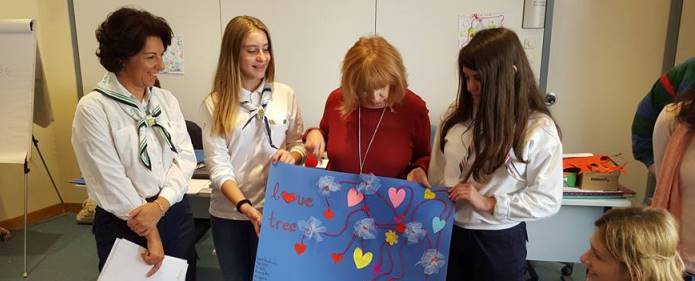
How Erasmus+ is helping to combat the growing issue of young people who self harm.
Self harming among young people is a major issue in the United Kingdom - and one which numerous studies have highlighted is increasing significantly, with some suggesting it is more prevalent in the UK than anywhere else in Europe.
Plymouth & District Mind Association (PADMA) deliver mental health training in Plymouth, Devon and Cornwall, with a particular focus on working with young people and are keen to see improved support and services for those affected.
Erasmus+ Key Action 2 funding provided the perfect opportunity for this, enabling PADMA to partner with organisations in Greece, Lithuania, Romania and Turkey who all have a shared interest or expertise in working with young people and/or mental health issues including deliberate self harm (DSH).
The six partners embarked on the DSH Positive Choices project, working to develop a common understanding of key issues leading to social exclusion – in particular DSH and alexithymia, where sufferers lack emotional awareness and social attachment and have difficulty recognizing the emotions of others.
The group also looked at issues around suicide in young people and sought to up-skill those working in this field.
Positive Choices
 Graham Nicholls, from PADMA, said: "DSH Positive Choices set out to improve quality in youth work through the creation of a best practice training resource, by partners from different cultural backgrounds, working in different fields of education, training and youth.
Graham Nicholls, from PADMA, said: "DSH Positive Choices set out to improve quality in youth work through the creation of a best practice training resource, by partners from different cultural backgrounds, working in different fields of education, training and youth.
"Over two years the project delivered 72 workshops focusing on alexithymia and DSH and other factors in young people's emotional awareness, resilience and self-confidence. We also trained youth workers in recognising and responding to symptoms and in supporting the young person to access specialist help.
"One of the highlights (pictured, with Graham second from left) was presenting the project for an hour on a Romanian cable TV station.
Bite-size learning
“The project involved evaluating in detail the different national approaches to supporting young people’s well-being and identifying best practice. We then created a new resource – a training kit, based on non-formal learning methods and incorporating the relevant practices identified through dialogue among the project partners.
"At each partnership meeting, the host organisation presented their practice at workshop sessions, showing how young people were helped to explore their feelings and empowered to make positive choices.
"The emphasis was to provide 'bite-size' learning activities that practitioners could, take away, implement themselves and then evaluate in time for the next round of learning activity.
"Each meeting included a contribution from a young person who talked about their actual experience, including from prior contact with the relevant project partners. We then presented this resource at a final international conference in Siauliai, Lithuania.”
Spreading the message
 Once home, participants shared their learning with colleagues and local stakeholders and made recommendations, adding to the impact from the shared training. The project's different outputs have formed an open training resource for all those working in the field of youth, particularly with young people who may be experiencing alexithymia and/or any other forms of emotional distress.
Once home, participants shared their learning with colleagues and local stakeholders and made recommendations, adding to the impact from the shared training. The project's different outputs have formed an open training resource for all those working in the field of youth, particularly with young people who may be experiencing alexithymia and/or any other forms of emotional distress.
Building bridges
“As a direct result of our Erasmus+ project we have all created informal stakeholder committees made up of mental health professionals, teachers, parent association members, young people and representatives from local authority young people services, to build bridges between people in need and our specialised support," said Graham.
"We have already seen the outputs of the project being embedded in the daily practices of each partner organisation and we are now exploring the potential for the project to become a development of innovation in its own right, through an accredited common training programme that can be mapped to the European Qualifications Framework.”
Could your organisation be interested in applying for funding for a youth partnership project? There are three deadlines to apply in 2019, find out more.
